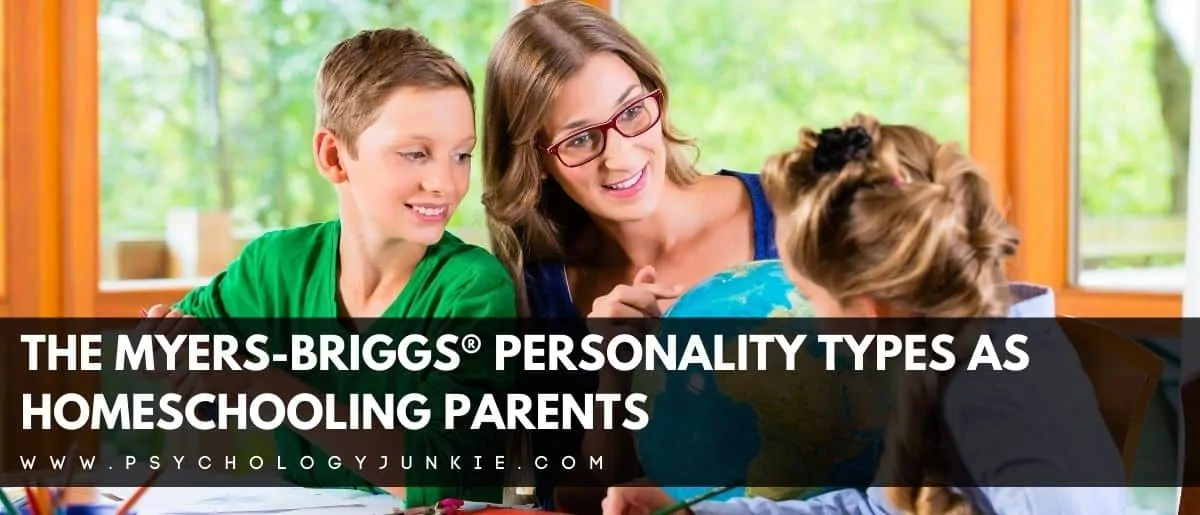The Myers-Briggs® Personality Types as Homeschool Parents
The ENFP Homeschooling Parent
This parent is driven by inspiration and enthusiasm. She believes that children are driven by the heart, and without touching the heart, any lesson would be pointless. A natural rule-breaker, the ENFP homeschooler will care less about perfect penmanship and more about creativity and imagination. She’ll look for areas of unique skill in each child, and she (or he) will try to foster those gifts. Education won’t be one-size-fits-all. It will be tailored to the nuanced needs of each child. Learning will be fun, interactive, and varied. One day they might learn about fractions by making pizza, the next day they could learn about science by making a bug hotel in the backyard. Interactive experiences and group conversations will be a regular part of the routine. This parent wants each of her children to feel like they have a “voice” to air questions and express their ideas.
Gifts of the ENFP Homeschool Parent:
- Makes learning fun and inspiring
- Is flexible and adapts to the child’s unique learning style
- Tunes into the individual gifts of each child
- Has a patient, empathetic approach
- Focuses on the big picture
- Knows how to connect with each child intimately
Struggles of the ENFP Homeschool Parent:
- Can struggle with nitty-gritty, detailed tasks.
- May jump around too much when explaining something and confuse the sensing children.
- May have a hard time being consistent and staying on-track with curriculum.
- May try to reach each child so individually that she runs out of time
- Sensing-Judging children might see this parent as unreliable or confusing if their needs for consistency and repetition aren’t met
The ENTP Homeschooling Parent
This parent broadens the imagination and critical thinking skills of their children. They welcome argument and debate, and encourage their children to ask “Why?” They also help guide their children through the process of critiquing their own thinking and getting to the root of their logic. As Thinking-Perceiving types, ENTPs are skilled at helping their children see the underlying logical frameworks of any system. They also have a knack for seeing educational possibilities that lie beyond the bounds of a boxed curriculum set. The ENTP parent wants their children to discover new ways of seeing and doing things. They want their children to think outside the box, question, and analyze. They enjoy bouncing ideas off of their children and being a sounding board for their child’s unique perspectives and ideas. Innovation, creativity, and friendly debate will be a staple in their home classroom.

Gifts of the ENTP Homeschool Parent:
- Facilitates an open, collaborative environment
- Encourages children to think outside-the-box
- Is flexible and can adapt based on the needs of the moment
- Helps children to refine their critical thinking skills
- Fosters imagination and big-picture thinking
- Doesn’t get so bogged down in details that they lose sight of the big picture
- Often uses humor as a way to keep children listening
Struggles of the ENTP Homeschool Parent:
- May struggle to stay on track and veer off in many different directions
- May struggle to stick to a schedule or routine
- May feel bored when dealing with a lot of rote repetition, something that is especially important for Sensing-Judging children
- Sensing-Judging children might see this parent as confusing or too scattered if their needs for consistency and a methodical approach to learning aren’t met
- May focus so much on the big picture that they miss important details in their teaching
The INFP Homeschooling Parent
The INFP parent is quietly affirming and inspiring. This parent will try to get to the core of each child and discover what drives them and motivates them. Then they will use this information to organize their approach to learning. If one child learns best by moving, she’ll have them repeat the time’s tables while jumping on the trampoline. If one child desperately wants to be an artist, she’ll have them write down their favorite quotes and then illustrate them with watercolor paintings. Education will be individualized rather than one-size-fits-all, and children will come to count on them for empathy and gentle guidance. The INFP has a unifying influence on her children and puts a lot of conviction and power into what they are teaching, even if their outside demeanor is quiet and gentle.
Gifts of the INFP Homeschool Parent:
- Compassionate and affirming with each child
- Skilled at creating an individualized educational plan for each child
- Fosters creativity and imagination
- Shows patience with their child’s pace and difficulties
- Is flexible and willing to change course if the curriculum or schedule isn’t working
- Focuses on the big picture
- Connects intimately with each child
Struggles of the INFP Homeschool Parent:
- May feel confined by a schedule and a strict routine and change directions too frequently
- May be too inconsistent and varied in her approach and confuse Sensing children
- May struggle with organizing a schedule and tasks to make sure they stay on track and finish things on time
- May struggle to handle arguments with debater types (NTs in particular)
- May fail to give enough specifics when teaching and be too roundabout in their focus, confusing Sensing children.
The INTP Homeschooling Parent
This parent brings imagination and strong analytical abilities to the home learning space. They are intellectually curious and patient, so they’re willing to really take the time to delve into a subject with their children and help them understand a concept without feeling rushed. Rather than focusing on deadlines and routines, this homeschooling parent listens to and discusses ideas with her children. She answers questions and gives children the space to try things in new ways and tackle projects on their own. Because of this, they foster their child’s self-esteem and independence. This parent is also unlikely to talk down to children or rush them, instead, taking their thoughts and questions seriously and helping their child think critically about subjects that other parents might rush through.
Strengths of the INTP Homeschool Parent:
- Instills a love of learning in his or her children.
- Finds multiple ways to build on a child’s curiosity
- Encourages children to think outside the box
- Facilitates critical thinking and encourages healthy debate
- Stays focused on the big picture
- Can make complex concepts easy for struggling learners to understand
Struggles of the INTP Homeschool Parent:
- May feel stifled by routines, schedules, and deadlines
- May be overly abstract/theoretical when explaining something and lose the focus of Sensing children
- May have difficulty remembering to give affirmation and praise and critique too frequently
- May struggle to stick to a routine and schedule and cause stress for Judging children
- May feel overwhelmed by being around children too much and not getting enough alone time
The ENFJ Homeschooling Parent
This parent is skilled at bringing children together and getting them excited about the material they will learn. Expressive and engaging, the ENFJ parent wants to get to the heart of each child and motivate them to realize their potential in life. Staying on track with time and a schedule usually isn’t a struggle for this parent, but they can have difficulty dealing with debate and they might need more time to respond to critical questions as the material gets more complex. ENFJs are gifted at being consistent while also understanding the unique feelings and needs of each child. They are their children’s cheerleaders and inspirers and give children the confidence to keep going. These parents are also likely to have found ways to keep their children socially engaged – lots of playdates and educational outings will be planned throughout the year.
Strengths of the ENFJ Homeschool Parent:
- Facilitates a feeling of unity and teamwork
- Affirms and praises children frequently
- Focuses on the big picture and doesn’t get bogged down by irrelevent details
- Has a gift for explaining conceptual material
- Stays on task and is consistent with a routine
Struggles of the ENFJ Homeschool Parent:
- May feel like they’ve “lost” themselves in the role of parent
- May not get enough time to explore individual interests
- May step in too quickly and not let children “struggle” to figure things out on their own
- May give instruction that is too vague for Sensing-Thinking children
The ENTJ Homeschooling Parent
This parent has a plan, a vision, and a strong sense of leadership. ENTJ instructors keep their eye on the big picture and the types of lessons that will be most beneficial in the future rather than sticking to a worn-out, traditional route that might not be relevant for the current day. Staying on track with a schedule and being on time isn’t a problem for these types. They are very conscious of how long a project takes to finish and plan accordingly. These parents enjoy a healthy debate with their children and don’t shirk when their children argue a point – in fact, they probably even like it. They often come up with unique challenges and games to amp up the energy and fun in the classroom.
Strengths of the ENTJ Homeschool Parent:
- Give children the tools they need to succeed in the long run
- Stay on track with schedules
- Inspire children to find their vision and go for it
- Keep thing efficient and running smoothly
- Skilled at breaking down complex theories and explaining them in a way that children can understand
Struggles of the ENTJ Homeschool Parent:
- May fail to give enough affirmation and praise
- Often dislike dawdling or emotional reactions from children
- May feel trapped by the rigorous schedule
- May expect children to have faster responses to questions than is natural for their personality types.
The INFJ Homeschooling Parent
Insightful and gentle, the INFJ parent wants to create a unique blueprint for success for each of her children. Rather than adhering to a one-size-fits-all curriculum, these types are likely to explore the learning styles and unique personalities and gifts of their children and tailor their plan accordingly. They will act as a guide to help their children fulfill their potential and stay focused on their desired outcomes in life. The school day will be filled with meaningful life lessons, read-alouds, and creative pursuits. Their steady and accepting presence encourages their children to stay the course and keep their minds focused on their dreams.
Strengths of the INFJ Homeschool Parent:
- Offers an empathetic and gentle presence
- Individualizes learning based on the child’s unique skills and needs
- Stays focused on the big picture
- Offers plenty of praise and affirmation
- Has a very progressive, forward-thinking perspective on education
Struggles of the INFJ Homeschool Parent:
- May be so focused on the big picture that he or she loses sight of important details along the way
- May be too abstract or vague in communication and need to be much more specific and sequential with Sensing students
- May be overwhelmed by the noise and chaos of juggling parenting and homeschooling
- If there’s a lot of arguing and over-reactions, she may suddenly “snap” and lose her temper when a school day isn’t going well
- Hates a lot of interruptions and can get flustered when homeschooling multiple children and having to jump back and forth between all of them
- May struggle to get enough needed alone time
Read This Next: 24 Signs That You’re an INFJ, the “Mystic” Personality Type
The INTJ Homeschooling Parent
INTJs are strategic and innovative homeschoolers. They are likely to spend a great deal of time planning out the curriculum they will buy and coming up with the ideal schedule. It usually isn’t hard for INTJs to stay on task and move at a steady pace towards their goals. They focus on the long-range objectives they have for their children and usually have an inner vision of how they want their homeschool year to go. These parents are typically gifted teachers who can break down large projects into manageable steps. They are also gifted at explaining complex concepts in a way that is understandable and easily applicable for their children.
Strengths of the INTJ Homeschool Parent:
- Skilled at outlining and planning schedules and agendas
- Has a progressive, forward-thinking perspective on education and will prepare children for the changing times.
- Stays focused on the task at hand and staying on schedule
- Has profound insight into concepts and how they can be applied to children
- Has a natural love of learning that they impart to children
Struggles of the INTJ Homeschool Parent:
- May struggle with the interruptions and noise of managing multiple children
- May forget to give enough praise or affirmation
- May have difficulty being flexible when changes need to be made
- May get overwhelmed by not having enough alone time to focus on independent pursuits
The ESFP Homeschooling Parent
Adventurous and curious, the ESFP parent makes learning hands-on and interactive rather than a sedentary exercise. Instead of repeating the times tables from a seated position, the ESFP parent will make a game of it that requires the kids to jump, skip, or run around in circles. Science will be all about exploring the outside world, digging in the dirt, and experiencing the world directly. Affirming and enthusiastic, the ESFP parent can make learning a thrilling experience – especially if they use their natural gifts instead of feeling like they have to alter themselves or go the “traditional” route.
Strengths of the ESFP Homeschool Parent:
- Flexible to the needs of the moment
- Makes learning engaging and interactive
- Individualizes education for the needs of her children
- Uses humor and storytelling to make education more exciting
- Gives real-world examples of why the lessons are important
- Has a pragmatic, realistic perspective
- Offers plenty of affirmation and encouragement
Struggles of the ESFP Homeschool Parent:
- May struggle to find a curriculum that fits with his/her more hands-on style
- May feel confined by the duties and responsibilities of homeschooling
- May get bored if homeschooling is too time consuming or sedentary
- May feel trapped by responsibilities if he/she is trying to juggle homeschooling, work, housework, cooking, etc,.
The ESTP Homeschooling Parent
Active and realistic, the ESTP parent believes that learning comes from real-life experience rather than a lot of rote memorization and bookwork. Homeschooling with an ESTP will involve a lot of hands-on projects, practical life skills, and spontaneous adventures. Instead of memorizing old historical quotes, children might learn how to craft a shelter in the wilderness. Instead of reciting the times tables from seated positions, they might rap the times tables while jumping around the house. Making learning an immersive, fun experience is something that ESTPs excel at.
Strengths of the ESTP Homeschool Parent:
- Prepares children for life in the real world with practical skills
- Keeps learning engaging and hands-on
- Can be flexible if the needs of the children change
- Encourages children to explore the world and learn through experience
- Knows how to make learning a “game” to make it more fun
Struggles of the ESTP Homeschooling Parent:
- Can feel confined by the rigorous schedule and demands of homeschooling
- Can struggle to be consistent or stick to a schedule
- May feel trapped by all the demands of work, homeschooling, housework, and other responsibilities
- May forget to give enough praise or affirmation
- May fail to see the importance of subjects that don’t have an immediate, real-world application
The ISFP Homeschooling Parent
Gentle and insightful, the ISFP homeschool parent wants to raise children who, first and foremost, have strong values and compassion. Second, they want to raise children who are prepared for life in a practical way. This parent works to understand the heart of each child and guide them towards an education that will coincide with their talents and values. For example, if one child cares about conservation, she might discuss science while doing a nature walk or collecting trash off the beach. Learning comes through living, so they will try to make education an interactive lifestyle rather than a sedentary six-hour series of lectures.
Strengths of the ISFP Homeschooling Parent:
- Provides gentle support and affirmation for students
- Individualizes education to make it inspiring for each child
- Teaches by example rather than simply giving lectures
- Flexibly adapts to the needs of the moment
- Prioritizes practical skills that are often left out in the classroom
Struggles of the ISFP Homeschooling Parent:
- May feel confined by the duties of homeschooling and other responsibilities
- Can struggle to stay consistent and on schedule
- May not get enough alone time
- May get overwhelmed by all the needs of the children and snap at them in a moment of stress, only to beat themselves up over it later
The ISTP Homeschooling Parent
This freedom-loving parent will try to educate his or her children through short, applicable lessons, and practical wisdom. These types encourage their children to think independently, argue, and test things with their own hands. They are unlikely to take a rigid, authoritative stance in the classroom. Instead, they opt for independence and learning through experience. Self-sufficiency is a high priority for this parent, so you’ll often find them teaching things like survival skills, money management, or how to cook on a budget. They are also likely to use multimedia to make school interesting and to get a break for themselves. Educational apps, games, and web sites will supplement teaching so that they can get a breather while children learn independently.
Strengths of the ISTP Homeschooling Parent:
- Fosters independence and self-sufficiency
- Is flexible to the needs of the moment
- Teaches through real-world application
- Prioritizes practical skills that often get ignored in a traditional classroom
- Utilizes many different hands-on styles of learning to make education immersive
Struggles of the ISTP Homeschooling Parent:
- May feel stifled by the social demands of homeschooling
- May struggle to give enough praise or affirmation
- May have a difficult time staying consistent and on-schedule
- May get frustrated with the emotional needs and sensitivities of multiple children
The ESFJ Homeschooling Parent
This parent is often tailor-made for homeschooling. In fact, according to the MBTI® Manual, these types are over-represented as elementary school teachers! Organized, detail-oriented, and encouraging, this parent is skilled at staying on schedule and providing gentle guidance. She (or he) provides a harmonious, comforting atmosphere and a steady routine so that children know what to expect and when. They also prioritize social experiences and will have a calendar filled with playdates, educational outings, and field trips. They takes a traditional stance on homeschooling and are often drawn to classical education and a curriculum that is thorough and tried-and-tested.
Strengths of the ESFJ Homeschooling Parent:
- Has strong attention to detail
- Provides a steady, stable routine
- Gives steady, gentle reassurance and affirmation
- Encourages real-life practical skills
- Encourages social and community involvement
Struggles of the ESFJ Homeschooling Parent:
- May place unrealistically high expectations on self
- Can get so caught up in the details that loses sight of the big picture
- Focus on repetition and memorization might bore or de-motivate intuitive students
- May be overly perfectionistic
The ESTJ Homeschooling Parent
Organized and efficient, ESTJs manage their home like a tight ship. Homeschooling starts at a specific time and flows like clockwork. This parent is detail-oriented and matter-of-fact, teaching practical life skills and creating a consistent routine. She’s likely to prioritize community involvement, helping out in nursing homes, cleaning up parks or beaches, or making runs to the neighborhood soup kitchen with canned goods. She’s also gifted at teaching children how to problem solve and find logical solutions to everyday problems. Her children are likely to learn how to run the laundry, fix a variety of meals, and manage money effectively.
Strengths of the ESTJ Homeschooling Parent:
- Strong sense of leadership and organization
- Teaches a variety of useful practical life skills
- Manages time well
- Keeps a consistent routine
- Has strong attention to detail and a methodical, steady-as-you-go focus
- Helps children repeat processes until they’re comfortable and confident
Struggles of the ESTJ Homeschooling Parent:
- May feel overly responsible and lose touch with herself/himself in the process of homeschooling
- May forget to give enough praise or affirmation
- May have overly high expectations of self and others
- May get lost in the details and forget the big picture (for example, focusing on the handwriting errors in a written report rather than the quality of the report itself).
The ISFJ Homeschooling Parent
Patient and thorough, the ISFJ parent is deeply in tune with her children’s physical and emotional needs. The school day will be comfortable, consistent, and filled with encouragement. ISFJs are extremely detail-oriented and will prioritize careful work and repetition so that the lessons are fully solidified in their children’s minds. They also enjoy a more traditional route to homeschooling – using tried-and-true curriculums and reading lots of reviews to make sure that other parents have had positive results with them. Many times this parent creates special rituals to make the school week more fun – for example, Friday might be field trip day or Mondays might begin with a special breakfast to kick off the school week.
Strengths of the ISFJ Homeschooling Parent:
- Detail-oriented and thorough
- Skilled at creating a consistent, comfortable routine
- Gentle and affirming personality
- Helps children work through projects sequentially so they’re not overwhelmed
- Tries to find special ways to make the school week enjoyable
- Is usually good at staying on schedule
Struggles of the ISFJ Homeschooling Parent:
- May feel guilty whenever she doesn’t perform perfectly, especially if she loses her temper
- Can get too stuck on the details and lose sight of the big picture
- May feel defeated when children complain about school work
- May not prioritize her own needs enough
- May get burned out from not getting enough alone time
- May struggle to be flexible if needed
The ISTJ Homeschooling Parent
Meticulous and down-to-earth, the ISTJ parent will go to great lengths to find the perfect curriculum for his or her family. Lots of time will be spent perusing catalogs, reading reviews, and looking at samples so that the most effective, accurate curriculum is chosen. Once the school year starts, children of the ISTJ parent will learn that their mom/dad is thorough, consistent, dependable, and probably a little nitpicky. Grammar mistakes will be quickly corrected, but the correction will be given alongside patient, step-by-step lessons on how to solve the problem. Ever practical, the ISTJ homeschooling parent will also prioritize real-life skills like how to change a tire, perform first aid, or put a meal together in the crockpot. This parent will also try to mix up lectures and repetition with time spent in nature. Exploring the world in a hands-on way is something that ISTJ parents value a great deal.
Strengths of the ISTJ Homeschooling Parent:
- Detail-oriented and thorough
- Skilled at breaking complex problems into step-by-step formulas
- Creates a consistent, steady routine
- Has strong time management skills
- Teaches children a variety of useful practical skills
- Repeats lessons thoroughly so that children feel fully confident in their skills
Struggles of the ISTJ Homeschooling Parent:
- May forget to give enough praise or affirmation
- Can be too nitpicky and forget to see the big picture
- Can struggle to be flexible when needed
- May not get enough alone time for herself
- May be overly perfectionistic with self
What Are Your Thoughts?
Did you enjoy this article? Do you have any insights or experiences to share? Let us know in the comments! Find out more about personality type in children and how to manage the ups and downs of parenting in our Parenting by Personality Course!
Find out more about your personality type in our eBooks, The INTJ – Understanding the Strategist, Discovering You: Unlocking the Power of Personality Type, The INFJ – Understanding the Mystic, and The INFP – Understanding the Dreamer. You can also connect with me via Facebook, Instagram, or Twitter!










I appreciate that ENFP is at the top of the list, so I don’t have to scroll. I’d have thought of seven different things and opened eight new tabs before getting to the ENFP content if it were further down ; )
Overall, this is a great article.
There is only one issue that needs correction: in first line of the ISTP section, you forgot the “c” in “children”.
Thank you for letting me know! I fixed it 🙂
Thank you for this. It explains quite a lot. I’m between ENTJ and ENSJ and I do love a list!
Correction: Thank you for this. It explains quite a lot. I’m between ENTJ and ENFJ and I do love a list!